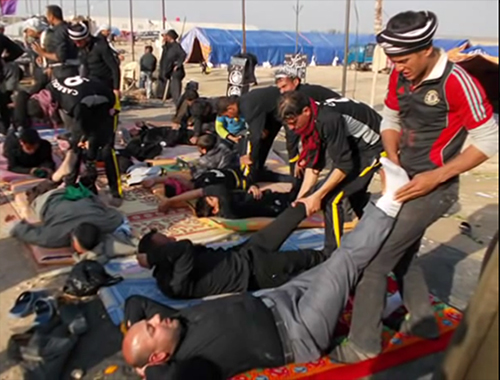When is it permitted to accept a position under rulership?
- Details
- Hits: 2359
When is it permitted to accept a position under rulership?
There are two situations where it is allowed to accept appointment in the service of oppressors and rather in some cases it becomes Wajib to do so. It is permissible when a person is forced to accept it or if he is practising Taqiyya. That is, if he refuses, his life property or honour will be in danger. Permissibility of accepting employment under tyrants is proved in many ways.
The Holy Prophet (S) has said,
“My people will not be questioned for what they are forced to do.”
(Khasael)
And Imam Sadiq (a.s.) has mentioned:
“There is nothing that Allah has not made permissible for one who is helpless.”
Imam RiÄa (a.s.) has been reported in Wasa’il ul-Shia to say that he accepted to be heir-apparent of Mamun under duress and Taqiyya. When Imam Ja’far as-Sadiq (a.s.) was asked about working for a tyrant king, he replied,
“It is not allowed, except when a person is not able to obtain his livelihood from any other means or if his life is in danger and his life depends on accepting some work from the tyrant. In that case it is allowed. But if he receives any remuneration from the tyrant he must pay Khums from it.”
(Wasa’il ul-Shia)
Such appointments are permissible when the job involves only peacekeeping and maintaining of law and order. Like posts in armies where the aim is to defend the borders of Muslim countries, to see to the welfare of believers and the downtrodden people, and to restore the rights to those who were deprived of it. Accepting service under tyrants is allowed in these circumstances provided one has a firm intention of dealing in a just manner. If the intention is to help the Shias specifically, it is more meritorious. Ziyad ibn Abi Salma says that he went to meet Imam Musa al-Kadhim (a.s.). Imam (a.s.) asked him if he was employed with the government? “Yes,” he replied. Imam (a.s.) asked, ‘Why?’
He replied, “I am benevolent and helpful to the needy so I cannot leave this job. Apart from this I have a family and children and I have no other means of livelihood.” Imam (a.s.) said,
“O Ziyad if I am taken to the top of a high mountain and thrown from it and my body is shattered to pieces. I would prefer that to doing some job for these people or even to step inside their threshold. Except for one condition. Do you know what that is?”
Ziyad said, “May my life be sacrificed for you; I don’t know.”
Imam (a.s.) continued,
“Except that I rescue the believers from grief and hardships or liberate an imprisoned believer, or repay the debts of a believer.” After this Imam (a.s.) went on to say, “O Ziyad! If you are employed under a tyrant, work for the welfare of your believing brothers so that it will recompense for the sins that you may happen to commit during your service period.”
Fazl Ibn Abdul RahmÄn says that I wrote a letter to Imam Musa al-Kadhim (a.s.) asking, “Please permit me to work on a governmental post.” Imam (a.s.) replied,
“You are permitted, provided you do not change my religious commands or cross the limits laid down by Allah. The compensation of your action will be your fulfilling the needs of your believing brother.”
(Mustadrak ul-Wasa’il)
‘Ali Ibn YaqtÄ«n, who was the Prime Minister of Caliph HarÅ«n, wrote to Imam Musa al-Kadhim (a.s.): “Please give me permission to resign from this post.” Imam (a.s.) replied to him,
“I do not consider it permissible for you to leave this governmental post because in the courts of tyrants there are people through whom Allah removes the difficulties of His loved ones. And they are the ones whom Allah has made immune from the fire of Hell. Hence fear Allah with respect to your brothers.”
(Mustadrak ul-Wasa’il)
Muhammad bin Ismail BazÄ« was also a minister in the court of HarÅ«n. He had the honour of meeting Three Imams, Imam Musa al-Kadhim (a.s.), Imam ‘Ali RiÄa (a.s.) and Imam Jawad (a.s.) who provided his own garment to serve as his shroud. He relates from Imam RiÄa (a.s.) that he said,
“There are people in the courts of tyrants through whom Allah manifests His proof and they are appointed in specific cities. Allah removes the difficulties of His loved ones through them and by them He brings about the welfare of Muslims. The believers take refuge with them in calamities. The needs of our needy Shias are fulfilled through these very people. And the Almighty Allah through their means imposes the fear and dread of the believers upon the houses of oppressors. These are the true believers who are the trust bearers of Allah on this earth. Congratulations to them for their position and post!”
Then Imam (a.s.) asked,
“Wouldn’t it be better that at least one of you reaches that position?”
Muhammad asked, “May my life be sacrificed for you. How can a person reach such a position?” Imam (a.s.) replied,
“Being with the tyrants, he makes the heart of our Shias happy; that makes us happy. O Muhammad! After you do this you will be considered among those people who have lofty positions.”
(BihÄr al-AnwÄr vol.15)











